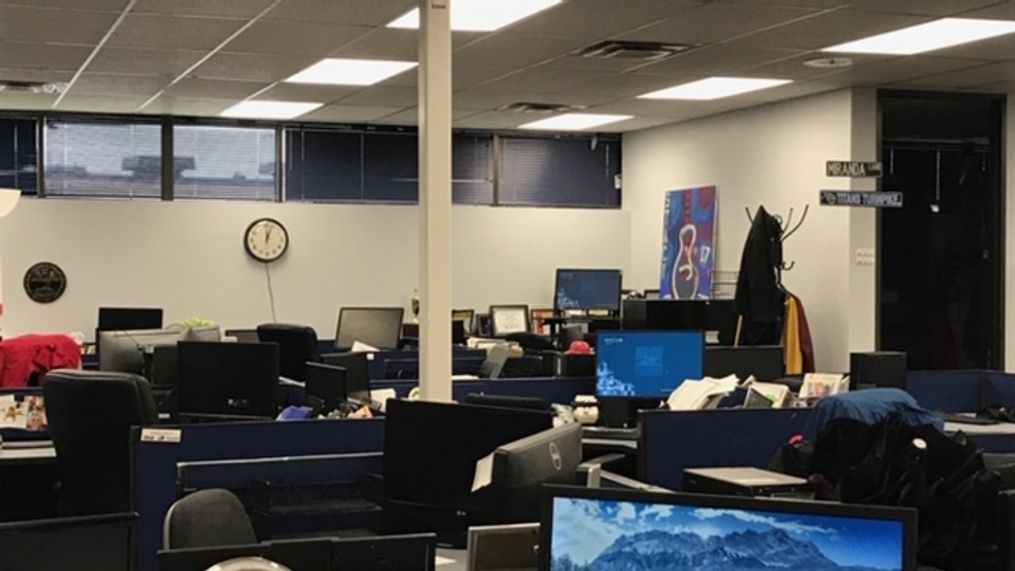Back to work? Infectious disease expert tips on navigating the office during COVID-19

NASHVILLE, Tenn. (WZTV) — Tennessee is among states which have reopened multiple industry sectors, leaving some workers faced with the prospect of returning to the office during the COVID-19 crisis.
With a vaccine for COVID-19 likely 12-18 months away, some Tennesseans who work in office settings or close-contact settings will be faced with questions on how to navigate their work environment during the new normal.
While not mandatory, the Tennessee Pledge -guidance from the state's Economic Recovery Team- offers guidelines for businesses reopening in different sectors. For offices, the guidelines call for screening employee temperatures, prohibiting congregation in break rooms, and social distancing among other adaptations.
WZTV spoke with Dr. David Aronoff, an Infectious Disease Specialist with Vanderbilt University Medical Center on how best to navigate the office until a treatment or vaccine is available. Dr. Aronoff says bottom line, the primary risk for workers in office settings is spending prolonged periods of time close together due to the virus being spread via respiratory droplets.
"Dispersal is increased by speaking or singing, but particularly by coughing or sneezing. These droplets generally travel about 6 feet or so unless they are released with a lot of force like with a cough or sneeze. Thus, the primary risk is being in a room with people who are infected and shedding virus into the air around them. That is why maintaining distance between people, even asymptomatic people, is important and the use of cloth masks is helpful," Dr. Aronoff says. "A major concern is the ability of people without any symptoms to spread the virus. Cloth masks help prevent their breath from dispersing widely around them. Bottom line, the primary risk is spending prolonged periods of time close together."
AVOID SHARING & CLEAN REGULARLY
Being back in the workplace also can mean increased use of materials, restrooms, doors, and other common areas that could harbor the virus. Dr. Aronoff says while the main way of contracting the virus is through respiratory droplets, people could inoculate themselves by transferring the virus from their skin to their eyes, nose or mouth.
The most likely scenario is by touching a contaminated surface, then touching your face which makes hand hygiene important. The virus won't infect you via skin contact but can be transferred by not practicing proper handwashing and touching your face.
"One way to reduce this risk is to clean/disinfect surfaces that lots of different people touch on a regular basis. This means disinfecting doorknobs, coffee pots (with soap and water), countertops," Dr. Aronoff says. "People should not share pens or phones if possible. But these are mostly risks to people if they forget to wash their hands after touching them."
WORK SPACES & VENTILATION
As noted in the Tennessee Pledge, social distancing at the workplace is advised. The good news is respiratory droplets generally don't linger in the air for a very long time but how long and how ventilated the work area is could increase risk.
"Anytime people spend prolonged periods of time in a poorly ventilated small space there is risk of transmission," Dr. Aronoff says. "Risk can be lowered by trying to improve ventilation of fresh air, keeping doors open when possible."
In addition, wearing cloth masks at work is advised, as is screening employee temperatures, also included in the Tennessee Pledge. Dr. Aronoff adds people should be encouraged to work from home when possible or try staggering shifts to allow for a reduced number of employees at the same time.
For office workers filling the same room or floor, should illness occur, the rate of infection could "potentially" multiply faster than the 1:1 ratio, meaning for every person infected, they infect one other.
CLOTHING
Many frontline workers and even those in construction have shared the measures they are taking to avoid potentially bringing the virus home. This has included changing clothes in a separate room or garage before entering the house.
Dr. Aronoff says he does not believe this has to be done unless the employee works in a high-risk environment for infection. However, changing clothing once home is something to consider. "The main thing is that clothing should be washed regularly and after changing clothes people should wash their hands," Dr. Aronoff says. "Essentially treat cloths as usual but consider changing clothes after returning from work."
Many of the practices cited by Dr. Aronoff are part of the guidelines in the Tennessee Pledge along with other guidelines. For businesses, the guidelines also call on offices to consider using plastic shields or barriers between workstations, seek alternative open spaces for meetings, and use clearly designated entrance and exit areas.
The guidelines and advice from Dr. Aronoff comes as the Tennessee Department of Labor reminds Tennesseans on unemployment refusing to return to work could put their benefits in jeopardy. Business owners have been given access to an online form where they can notify the department of an employee's refusal, leading to an investigation to determine if the employee might not be eligible for employment.

















